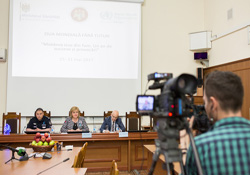Republic of Moldova celebrates one-year anniversary of smoke-free public places

WHO/Igor Vrabie
The Republic of Moldova marked World No Tobacco Day 2017 by celebrating the one-year anniversary of its historic decision to ban smoking in enclosed public places. The full ban entered into force on 31 May 2016, a year after Parliament adopted a series of amendments to laws strengthening tobacco control.
The new legislative provisions of Law No. 278 (14 December 2007) prohibit smoking in all enclosed and semi-enclosed public places, including common areas at work, regardless of type of property or means of access. The provisions also ban smoking in all open public spaces managed by health-care institutions, educational institutions, and local and central public authorities, including adjacent managed territories, and within 10 metres of the entrances, operable windows and ventilation systems of enclosed public places.
At a joint press conference organized by the Ministry of Health, the Ministry of Internal Affairs and the WHO Country Office, Deputy Minister of Health Dr Aliona Serbulenco underlined the Republic of Moldova’s major achievements in tobacco control in 2016–2017. These include:
- the enforcement of tobacco control law provisions through the development of supportive materials for different target groups (guidelines, instructions, booklets, videos, etc.), a hotline at the National Centre for Public Health to report violations of the law, and trainings and informative sessions for different target groups such as public health specialists, police, and restaurant, bar and hotel owners and managers;
- the development of bylaws on the ingredients, marketing, packaging and labelling of tobacco and related products, as well as on reporting on them;
- the development of the draft National Programme on Tobacco Control for 2017–2021;
- capacity-building among primary health care staff for smoking cessation interventions;
- the establishment of a counselling and treatment service at the Republican Narcological Dispensary to support smokers who want to quit; and
- the organization of national policy dialogues in partnership with the Parliament on implementation outcomes of the tobacco control law and tobacco taxation policy.
“The endorsement of the National Programme on Tobacco Control for 2017–2021 is our priority for the upcoming months,” stressed Dr Serbulenco. “The goal of the Programme is to improve population health through the reduction of tobacco consumption and the full implementation of the WHO Framework Convention on Tobacco Control.”
Theatre performance: “There is always something better to do than smoke”
A special moment during the press conference constituted the theatre performance “There is always something better to do than smoke”, presented by Ms Olga Guțu-Cucu, Ms Ana Tkacenko and Ms Doina Severin from the national theatre Mihai Eminescu. Mr Marcello Bosschar, a stage director, trainer and member of the teaching board at The Commedia School in Copenhagen, Denmark, wrote the play. It had previously been performed in Denmark and Montenegro.
Additional celebrations and awareness-raising activities included an awards ceremony for family doctors who contributed to the tobacco control measures and helped smokers to quit, and for restaurants and cafés that respected the law provisions.
Participants in Tiraspol organized a round-table discussion on tobacco control for specialists, youth and journalists that highlighted the health and additional risks associated with tobacco use. The actors also presented the theatre performance on the left bank of the Nistru River.
Youth organized a flash mob in front of the Tiraspol Library to animate the word “NO” to tobacco use. The same day, students distributed flyers with a timetable for quitting smoking, a summary of the economic benefits of quitting, and caps, t-shits and balloons with additional anti-tobacco messages.
The activities in Tiraspol and Chisinau took place within 2 broader projects: the Support to Confidence Building Measures Programme, funded by the European Union; and the Support to Strengthening Governance and Policy Dialogue in Health Sector – 2nd Phase, funded jointly by WHO and the Swiss Agency for Development and Cooperation. WHO/Europe also contributed technical assistance and capacity-building activities in the health sector.



